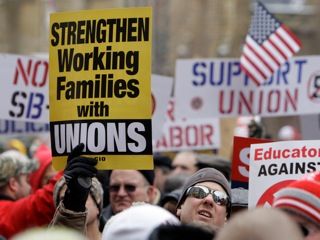
Publisher:
Bonnie King
CONTACT:
Newsroom@Salem-news.com
Advertising:
Adsales@Salem-news.com

~Truth~
~Justice~
~Peace~
TJP
Jul-31-2011 13:54

 TweetFollow @OregonNews
TweetFollow @OregonNews
Right-To-Work-For-Less Laws
Ralph E. Stone Salem-News.comUnions are the only large-scale movement left in America that persistently acts as a countervailing balance against corporate power.
 Photo by Jay LaPrete/AP |
(SAN FRANCISCO) - While vacationing in Charleston, South Carolina earlier this year, the local media were full of editorials complaining about the April 20, 2011, complaint issued by the National Labor Relations Board against Boeing Company www.nlrb.gov/sites/default/
South Carolina is a right-to-work (RTW) state whereas Washington state is a non-RTW state. I am sure that Boeing took this into consideration when it relocated to South Carolina. Section 14(b) of the Taft-Hartley amendments to the Labor Management Relations Act, 29 U.S.C §141, permits a state to pass laws that prohibit unions from requiring a worker to pay dues, even when the worker is covered by a union-negotiated collective bargaining agreement. Thus, workers in RTW states have less incentive to join a union and to pay union dues and as a result, unions have less clout vis-à-vis corporations.
Today, 22 states have RTW laws. These states are located predominantly in the South and Southwest.
Proponents of RTW laws claim that the economies with such laws grow faster and their citizens are better off. But with their faster growing populations, RTW states had unemployment rates averaging 8 percent in April of this year, just below the 8.2 percent average in non-RTW states.
The Compensation Penalty of "Right-To-Work" Laws (February 17, 2011 Economic Policy Institute Briefing Paper #299) www.epi.org/page/-/old/briefingpapers/BriefingPaper299.pdf?nocdn=1, economists Elise Gould and Heidi Shierholz examined the differences in compensation between RTW and non-RTW states.
Controlling for the demographic and job characteristics of workers as well as state-level economic conditions and cost-of-living differences across states, they found that in 2009 wages were 3.2 percent lower in RTW states versus non-RTW – about $1,500 less annually for a full-time, year-round worker; the rate of employer-sponsored health insurance was 2.6 percentage points lower in RTW states compared with non-RTW states; the rate of employer-sponsored pensions was 4.8 percentage points lower in RTW states. And, in 2008, the rate of workplace deaths was 57 precent higher in RTW states than non-RTW states, while the 2009, poverty rate in RTW states averaged 15 percent, considerably above the 12.8 percent average for non-RTW states.
Gould and Shierholz concluded, "RTW legislation misleadingly sounds like a positive change in this weak economy, in reality the opportunity it gives workers is only that to work for lower wages and fewer benefits. For legislators dedicated to making policy on the basis of economic fact rather than ideological passion, our findings indicate that, contrary to the rhetoric of RTW proponents, the data show that workers in “right-to-work” states have lower compensation – both union and nonunion workers alike."
Why do we need unions anyway?
Because they are essential for America. Unions are the only large-scale movement left in America that persistently acts as a countervailing balance against corporate power. They act in the economic interests of the middle class.
But the decline of unions over the past few decades has left corporations and the rich with essentially no powerful opposition. You may take issue with a particular union's position on an issue, but remember they are the only real organized check on the power of the business community in this country. RTW laws are anti-union, pro-business
It is not surprising that RTW states generally vote Republican while the Democratic Party receives significant support from organized labor, who supply a great deal of the money, grass roots political organization, and voting base in support of the party.
RTW laws then are really “right-to-work-for-less” laws, as union critics call them. They are great for business, but not so great for the workers and the economies of RTW states.
 Salem-News.com writer Ralph E. Stone was born in Massachusetts. He is a graduate of both Middlebury College and Suffolk Law School. We are very fortunate to have this writer's talents in this troubling world; Ralph has an eye for detail that others miss. As is the case with many Salem-News.com writers, Ralph is an American Veteran who served in war. Ralph served his nation after college as a U.S. Army officer during the Vietnam war. After Vietnam, he went on to have a career with the Federal Trade Commission as an Attorney specializing in Consumer and Antitrust Law. Over the years, Ralph has traveled extensively with his wife Judi, taking in data from all over the world, which today adds to his collective knowledge about extremely important subjects like the economy and taxation. You can send Ralph an email at this address stonere@earthlink.net
Salem-News.com writer Ralph E. Stone was born in Massachusetts. He is a graduate of both Middlebury College and Suffolk Law School. We are very fortunate to have this writer's talents in this troubling world; Ralph has an eye for detail that others miss. As is the case with many Salem-News.com writers, Ralph is an American Veteran who served in war. Ralph served his nation after college as a U.S. Army officer during the Vietnam war. After Vietnam, he went on to have a career with the Federal Trade Commission as an Attorney specializing in Consumer and Antitrust Law. Over the years, Ralph has traveled extensively with his wife Judi, taking in data from all over the world, which today adds to his collective knowledge about extremely important subjects like the economy and taxation. You can send Ralph an email at this address stonere@earthlink.net
Articles for July 30, 2011 | Articles for July 31, 2011 | Articles for August 1, 2011
Quick Links
DINING
Willamette UniversityGoudy Commons Cafe
Dine on the Queen
Willamette Queen Sternwheeler
MUST SEE SALEM
Oregon Capitol ToursCapitol History Gateway
Willamette River Ride
Willamette Queen Sternwheeler
Historic Home Tours:
Deepwood Museum
The Bush House
Gaiety Hollow Garden
AUCTIONS - APPRAISALS
Auction Masters & AppraisalsCONSTRUCTION SERVICES
Roofing and ContractingSheridan, Ore.
ONLINE SHOPPING
Special Occasion DressesAdvertise with Salem-News
Contact:AdSales@Salem-News.com

googlec507860f6901db00.html



Terms of Service | Privacy Policy
All comments and messages are approved by people and self promotional links or unacceptable comments are denied.
Charles B August 8, 2011 3:01 pm (Pacific time)
Apparently David B's reading comprehension interferes with his ideological knee-jerking, wait... I got that backward...never mind... Dave, read again the part where it says "Controlling for the demographic and job characteristics of workers as well as state-level economic conditions and cost-of-living differences across states" That means 1) your premise, that the author did not take the "actual standard of living" into account is false, rendering your conclusion null at best, intentionally malicious at worst. and 2) that makes you either an idiot or a liar... any preference as to which?
Douglas Benson August 3, 2011 8:08 am (Pacific time)
First of all lets not feed the government troll [whatever your name really is ] . Ive seen what happens when states go right to work . It sounds good but the impact on thier economy is far from good . Idaho turned into a ghost town ,wages fell sharply across the board ,and everone who could fled the state. RTW is much more than just anti-union .It turns everyone into independent contractors . The men I talked to said they were working footage at 6 cents a foot ,had to buy thier own nails and screws ,had to pay thier own taxes ,no workmans comp ,no unemployment,no contractors lic. ,no bond,etc. and that was for what little work there was since very few could afford to build homes in a right to work state. Now the unions are coming back to Idaho ,I guess it didnt work out too well for the builders in the long run either . Peace
David B. August 1, 2011 1:44 pm (Pacific time)
The wage study quoted is fatally flawed because it does not take into account the actual cost of living in the states being compared. For example, in the Boeing case, the lower cost of living in South Carolina means that a non-union Boeing worker, despite lower "wages", actually enjoys a higher standard of living than the union worker in Washington state.
COLLI August 1, 2011 12:00 pm (Pacific time)
It certainly appears that this is exactly what is going on doesn't it?
Daniel Johnson July 31, 2011 3:29 pm (Pacific time)
It's nothing short of amazing how the American people have been gulled into voting and acting against their own best interests.
[Return to Top]©2025 Salem-News.com. All opinions expressed in this article are those of the author and do not necessarily reflect those of Salem-News.com.